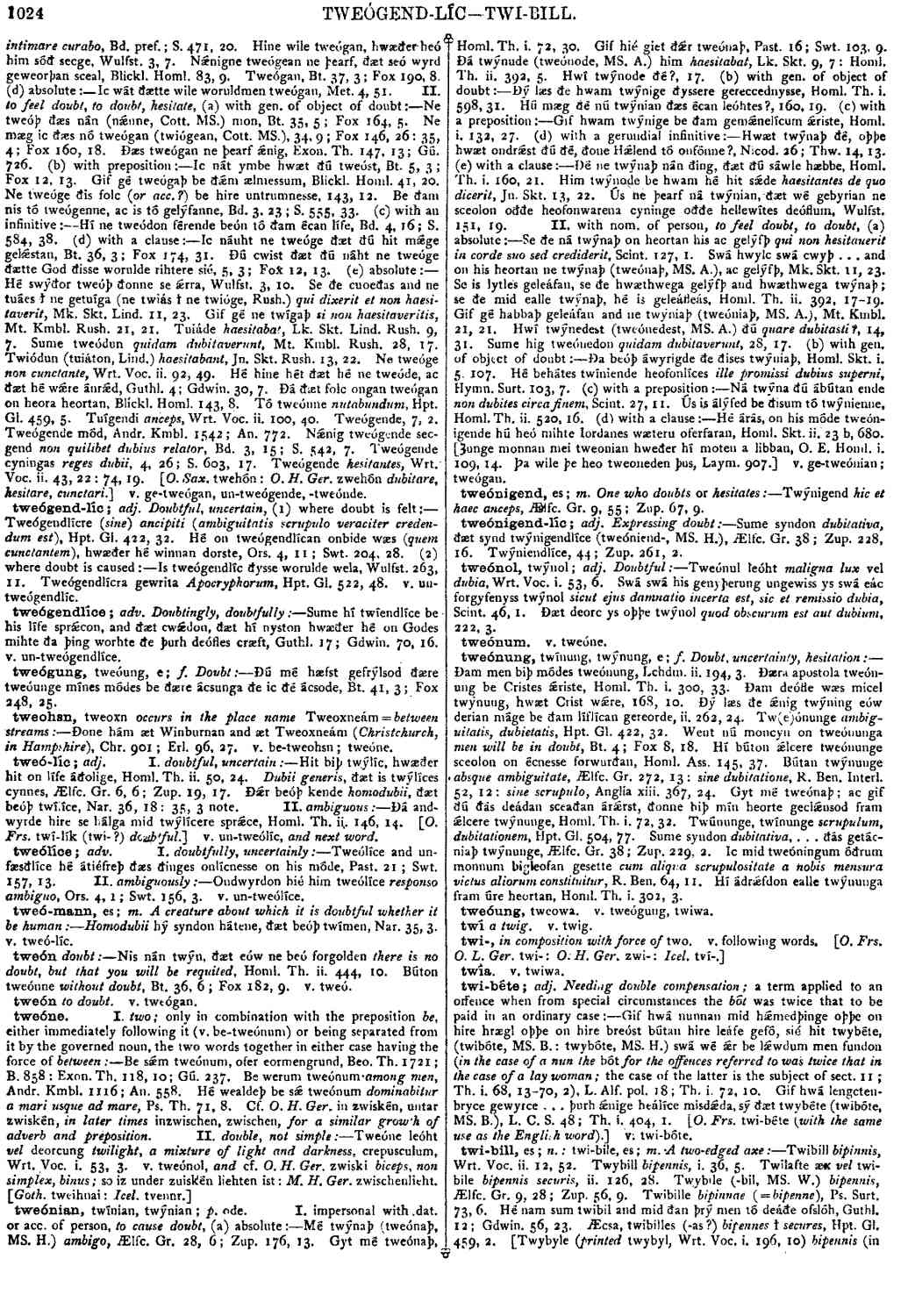tweónian
- verb [ weak ]
-
Mé twýnaþ (tweónaþ, MS. H.)
ambigo,
- Ælfc. Gr. 28, 6; Zup. 176, 13.
-
Gyt mé tweónaþ,
- Homl. Th. i. 72, 30.
-
Gif hié giet ðǽr tweónaþ,
- Past. 16; Swt. 103. 9.
-
Ðá twýnude (tweónode, MS. A.) him
haesitabat,
- Lk. Skt. 9, 7: Homl. Th. ii. 392, 5.
- Hwí twýnode ðé?, 17.
-
Ðý læs ðe hwam twýnige ðyssere gereccednysse,
- Homl. Th. i. 598, 31.
-
Hú mæg ðé nú twýnian ðæs écan leóhtes?,
- 160, 19.
-
Gif hwam twýnige be ðam gemǽnelícum ǽriste,
- Homl. i. 132, 27.
-
Hwæt twýnaþ ðé, oþþe hwæt ondrǽst ðú ðé, ðone Hǽlend tó onfónne?,
- Nicod. 26; Thw. 14, 13.
-
Ðé ne twýnaþ nán ðing, ðæt ðú sáwle hæbbe,
- Homl. Th. i. 160, 21.
-
Him twýnode be hwam hé hit sǽde
haesitantes de quo dicerit,
- Jn. Skt. 13, 22.
-
Ús ne þearf ná twýnian, ðæt wé gebyrian ne sceolon oððe heofonwarena cyninge oððe hellewítes deóflum,
- Wulfst. 151, 19.
-
Se ðe ná twýnaþ on heortan his ac gelýfþ
qui non hesitauerit in corde suo sed crediderit,
- Scint. 127, 1.
-
Swá hwylc swá cwyþ . . . and on his heortan ne twýnaþ (tweónaþ,
- MS. A.), ac gelýfþ, Mk. Skt. 11, 23.
-
Se is lytles geleáfan, se ðe hwæthwega gelýfþ and hwæthwega twýnaþ; se ðe mid ealle twýnaþ, hé is geleáfleás,
- Homl. Th. ii. 392, 17-19.
-
Gif gé habbaþ geleúfan and ne twýniaþ (tweóniaþ,
- MS. A.), Mt. Kmbl. 21, 21.
-
Hwí twýnedest (tweónedest, MS. A.) ðú
quare dubitasti?,
- 14, 31.
-
Sume hig tweónedon
quidam dubitaverunt,
- 28, 17.
-
Ða beóþ áwyrigde ðe ðises twýniaþ,
- Homl. Skt. i. 5, 107.
-
Hé behátes twíniende heofonlíces
ille promissi dubius superni,
- Hymn. Surt. 103, 7.
-
Ná twýna ðú ábútan ende
non dubites circa finem,
- Scint. 27, 11.
-
Ús is álýfed be ðisum tó twýnienne,
- Homl. Th. ii. 520, 16.
- (dl with a clause :-- Hé árás, on his móde tweónigende hú heó mihte Iordanes wæteru oferfaran, Homl. Skt. ii. 23 b, 680.
Bosworth, Joseph. “tweónian.” In An Anglo-Saxon Dictionary Online, edited by Thomas Northcote Toller, Christ Sean, and Ondřej Tichy. Prague: Faculty of Arts, Charles University, 2014. https://bosworthtoller.com/31223.
Checked: 0